
WPX and SiteGround are famous for their fast, reliable, and feature-rich WordPress hosting. Given the stark similarity, you may wonder which one is better for you. Is it SiteGround or WPX? Believe it or not, this question bothers thousands of other people.
You’re hardly the only one! Luckily for you, we have concrete answers, and in this 2025 comparison, we’ll explain why we sided with SiteGround in the end despite loving both. Several tests lie ahead as we compare their prices, features, speeds, security, and other key aspects.
SiteGround is our winner, but it may not necessarily be the best web hosting for you. That’s why you should stick with us until the end, learn more about their pros and cons, and make an informed decision based on your business goals. Let’s dive in. The battle gong just echoed.
WPX vs SiteGround Compared in 2025
| SiteGround | WPX Hosting | |
| Types of Hosting | Shared (WordPress + WooCommerce), cloud, reseller | WordPress and WooCommerce |
| Storage Size | Up to 40 GB | Up to 100 GB |
| Bandwidth | Unmetered | 200 GB to unlimited |
| Hosted Websites | Up to unlimited | Up to 35 |
| Backups | Daily and on-demand | Daily and on-demand |
| Starting Price | $3.99 per month | $20.83 per month |
| Money-Back Guarantee | 30 days | 30 days |
| Ease of Use | Very easy | Easy |
| Site Migration | Free | Free |
| Free Domain | No | No |
| Security | DDoS protection, AI anti-bot, WAF, proactive website monitoring, and free SSL | Hybrid DDoS protection, brute-force protection, WAF, free SSL, daily malware scans, and WHOIS privacy |
| Email Accounts | Unlimited | Unlimited |
Plans and Pricing
When it comes to web hosting, people are often concerned with the cost. The rule of thumb is that it’s a few dollars a month, but some providers, like WPX, tend to go overboard. Speaking of it, WPX offers two types of plans: WordPress and WooCommerce. WordPress plans start at $20.83 per month, as shown below.

You can also see the Professional and Elite plans. They’re pretty expensive. These plans contain roughly the same features, but they differ in the number of hosted websites, storage capacity, bandwidth, and other key aspects. WooCommerce plans are pricier, and the Powerstore “deal” costs $29.17 per month as the lowest-tier option.

WPX doesn’t charge you extra for specific features, unlike WP Engine, which is a notable advantage. Instead, you’ll pay more only if you need more features. The same applies to SiteGround, whose plans are significantly less expensive. The StartUp plan is only $3.99 per month, while the GrowBig one is $6.69 per month.
Get the Best Price on SiteGround

The latter is simultaneously our recommendation. It’s not the cheapest web hosting plan, but it’s still considerably less expensive than all WPX plans. Moreover, SiteGround also includes a comprehensive list of features, and unlike WPX, it hosts an unlimited number of websites in its mid-tier plan.
It’s worth noting SiteGround’s cloud hosting. While WPX relies solely on shared hosting, SiteGround offers a range of cloud hosting plans for those seeking more raw power.
A significant advantage is that SiteGround offers WooCommerce and managed WordPress support across all plans, enabling you to launch an online store without incurring additional costs. WPX, as you saw, works in a completely different way.
Do They Offer a Money-Back Guarantee?
WPX and SiteGround offer a 30-day money-back guarantee for first-time purchases. They’ll fully refund you for their hosting services if you are not satisfied with them. Please note that neither of them offers a free domain name. However, you can purchase one directly from their websites.
A domain name, which typically costs $15 to $20 annually and is paid upfront, is non-refundable. Therefore, if you purchase a hosting plan and a domain, the only refund you’ll receive is for the hosting. It sounds like a “partial” refund, but no domain provider will ever refund a domain purchase. That’s how it works.
Overall, SiteGround is a clear winner, with prices multiple times lower than those of WPX Hosting. As you’ll soon see, its lower price doesn’t make SiteGround any worse. If anything, it’s on par with, if not better than, WPX Hosting in specific instances.
🏆 Winner: SiteGround
Hosting Management: Which Web Hosting is Easier to Use?
You’ll be able to run circles around SiteGround’s interface. The proprietary panel, aptly named Site Tools, is all you need to experience ultimate joy. Modern, sleek, and intuitive, Site Tools is the pinnacle of web hosting. We especially appreciate the option to pin your most frequently used tools, which enhances the experience.
Furthermore, Site Tools “transpires” on a single page, which removes loading times as you cycle through different tools and features. We love SiteTools because it allows for swift WordPress updates. At the start, you can also install WordPress with about three clicks and log in right away.
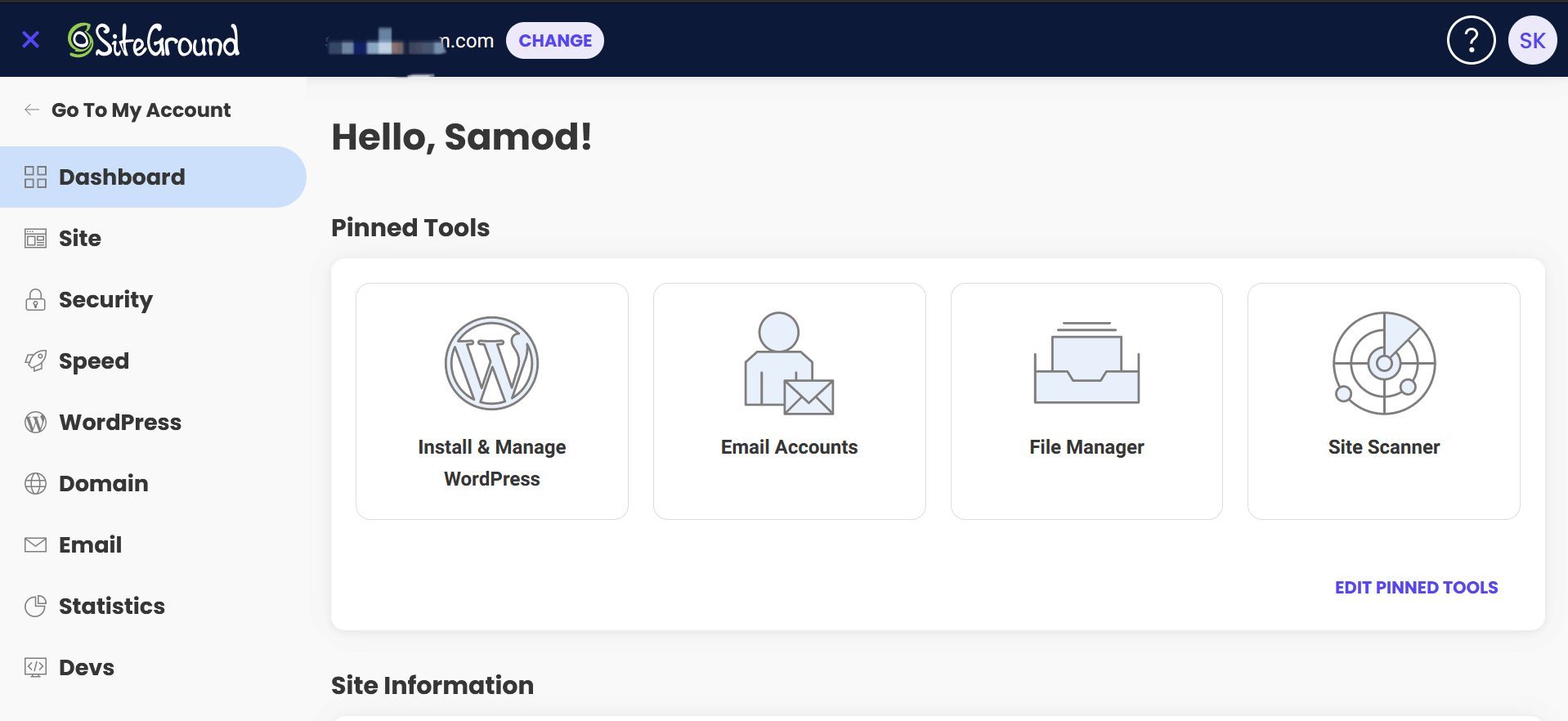
Site Tools also allows you to install WooCommerce with WordPress and create an online store. Moreover, SiteGround’s Staging environment is beautifully integrated, allowing you to create a carbon copy of your website and experiment with it. Overall, SiteGround is as beginner-friendly as it gets.
WPX Hosting is on par. We’d say it looks a bit unappealing due to its unusual blend of colors, which resembles the multivitamin juice you can buy at a local gas station. However, this flagship web hosting is no less intuitive, with a handy menu on the left side for accessing all vital features.
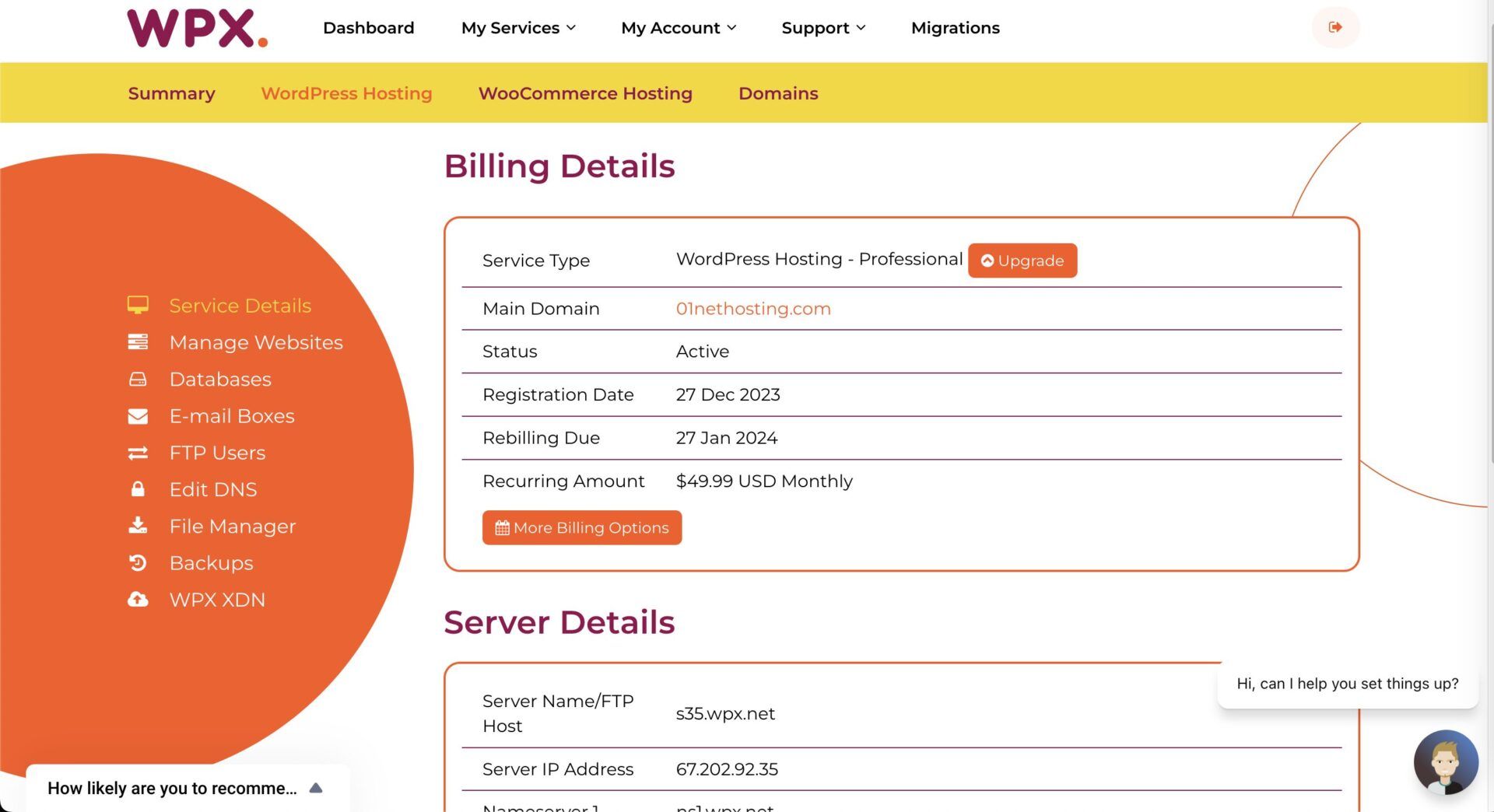
In WPX, you have to apply your SSL manually, but that’s a one-click job. Staging is also designed intuitively, with one-click copies of your website. However, please note that a staging website also takes up a spot for a “real” website. WPX Hosting resembles a cute, retro look, in our opinion.
However, beneath the outdated interface lies exceptional functionality that many newcomers will welcome with open arms. Still, SiteGround’s sleeker and more professional look, paired with a slightly more intuitive and functional interface, scratches our itch marginally more. That’s why we give it a slight edge.
🏆 Winner: SiteGround
SiteGround vs. WPX Hosting Features
We invite you to read our full SiteGround review for a breakdown of its features. You can do the same for WPX Hosting, which we tested recently. This time, we’ll focus on their most notable features and explain crucial differences for a profound understanding of the WPX vs SiteGround evaluation.
Hosting Features (SiteGround Wins)
Hosting resources are superior in SiteGround. This provider offers unlimited bandwidth in all plans. While it can host a single site in its StartUp plan, the rest of them support unlimited websites. On the other hand, WPX Hosting’s entry-level plan provides hosting for just a couple of websites, as shown in the screenshots above.
They also limit your bandwidth (200 to 400 GB), which isn’t ideal when you have more visitors than expected.
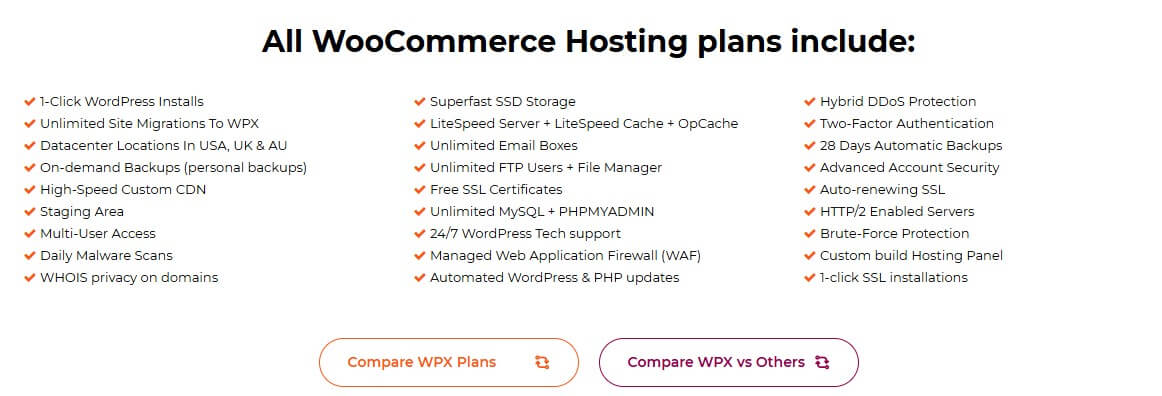
Both providers, however, offer free site migrations and SSD storage (WPX offers larger storage), along with unlimited email addresses for your domain. Staging is absent from SiteGround’s StartUp plan, while it’s there in all WPX plans. Given their exceptionally high prices, this feature is still more affordable in SiteGround hosting.
Moving on to website backups, we can see some similarities. Both offer daily and on-demand backups across all plans. SiteGround and WPX Hosting also come with advanced object caching; however, we prefer SiteGround’s NGINX over LiteSpeed caching in WPX Hosting.

As for other freebies, SiteGround and WPX are very generous. Each provider offers free SSL, DDoS protection, and other vital features. We’ll discuss their security later, but for now, we’d like to mention that WPX includes WHOIS privacy for an entire year if you purchase a domain through it.
SiteGround doesn’t, which is a missed opportunity, considering that WHOIS privacy is mandatory in 2025. However, even investing in it additionally won’t exceed the minimal cost of WPX, so again, it’s hard to blame SiteGround.
Server Locations (SiteGround Wins)
SiteGround offers a variety of server locations to cater to a worldwide audience.
WPX, however, includes servers only in the USA, the UK, and Europe. Meanwhile, SiteGround even has hosting servers in Singapore, with the rest located across the USA, several European countries, and more. In total, it offers around ten locations. WPX, as you see, only has three.
We mentioned that WPX leverages LiteSpeed servers that, while blazing-fast, are slightly slower than NGINX servers from SiteGround. Additionally, SiteGround’s servers are eco-friendly, utilizing 100% renewable energy, which means you’re contributing to a lower level of pollution by using their services.
Other Features (Tie)
We haven’t mentioned all the other features we discovered during our WPX vs. SiteGround testing.
One of our favorites was the ability to add collaborators and have multiple people operate in the same environment. This is quintessential for start-up businesses with a few or more employees, each with a specifically assigned task.
In SiteGround, we liked its freshly baked website builder, which endorses no-code site-building with AI assistance. It includes a variety of high-quality templates and elements that you can use to easily build basic websites.
While not the best website builder ever, it’s a handy addition for those who need it.
All things considered, as surprising as it may sound, SiteGround ultimately ended up with roughly the same features as WPX. WPX Hosting offers more storage and WHOIS privacy, while SiteGround excels in hosting multiple sites, providing a generous bandwidth allowance, offering server locations, and featuring a user-friendly website builder.
🏆 Winner: SiteGround
Speed & Uptime Tests
It’s time for some speed tests that you’ll no doubt find the most interesting.
For this WPX Hosting vs SiteGround 2025 comparison, we used WPX’s entry-level WordPress plan, while SiteGround offered the GrowBig plan as the best option that we used. Since both providers offer US-based servers, we chose them for our testing website, which we created using WordPress.
To ensure maximum accuracy, we used the same theme and uploaded the same images, videos, and blog content. This was to prevent other optimization-related factors from skewing the results. Lastly, our tests were primarily conducted using Pingdom, Loader, and GTmetrix, as these are among the best evaluation tools.
Uptime & Response Time Results
Speaking of Pingdom and Loader, this is where we tested their uptimes and response times.
Both providers ultimately adhered to their 99.95% uptime promises, with only a few brief downtimes during the 2 months. These downtimes combined never lasted more than a few minutes, resulting in affordable and readily accessible websites at all times.

While testing their response times, we were impressed with their results:
- SiteGround achieved an impressive average response time of 149 ms. The minimum was 137 ms, while the maximum was only 292 ms. For reference, the upper limit of shared hosting is approximately 600 ms, making this result one of the best we’ve seen.
- WPX Hosting achieved an average response time of 26 ms, which was another ‘Holy Cow!’ moment. This time, we screamed even louder because WPX’s minimum was 25 ms, with the maximum reaching only 34 ms.
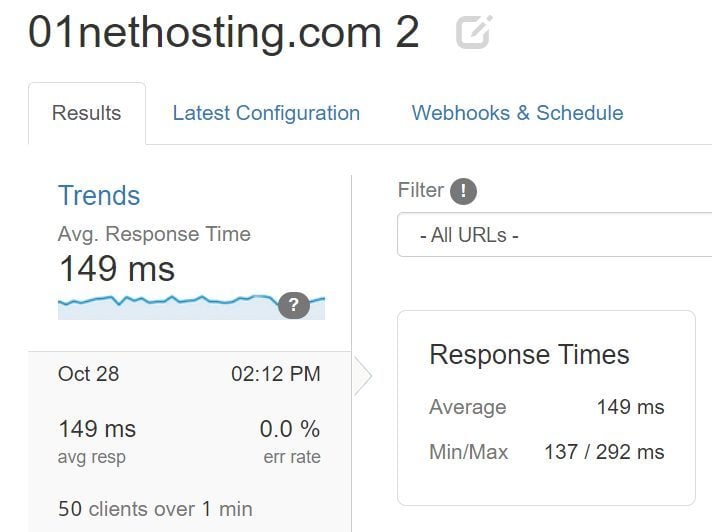
WPX Hosting no doubt takes this part of the speed comparison, and we must say we’re impressed. Very few providers can outpace SiteGround and its performance-oriented hosting technology, except for Hostinger and a few more (examine our Hostinger review here).
Page Load Speed Comparison
Our page load speed comparison was performed using GTmetrix.
It features many testing locations, but we ultimately chose Toronto as it’s free and accessible to everyone with an account. In this constellation, we observed several performance indicators, such as:
- Time to First Byte (TTFB). The time it takes for the server to respond to the first request sent by the user’s browser.
- First Contentful Paint (FCP). The time it takes to load and display the first item on the web page.
- Largest Contentful Paint (LCP). The time it takes to load and display the largest visible item on the web page.
- Fully Loaded Time (FLT). The time it takes for the page to load fully.
We know you’re excited to see the results, so here are our findings for SiteGround:
- TTFB: 253 ms
- FCP: 353 ms
- LCP: 484 ms
- FLT: 708 ms
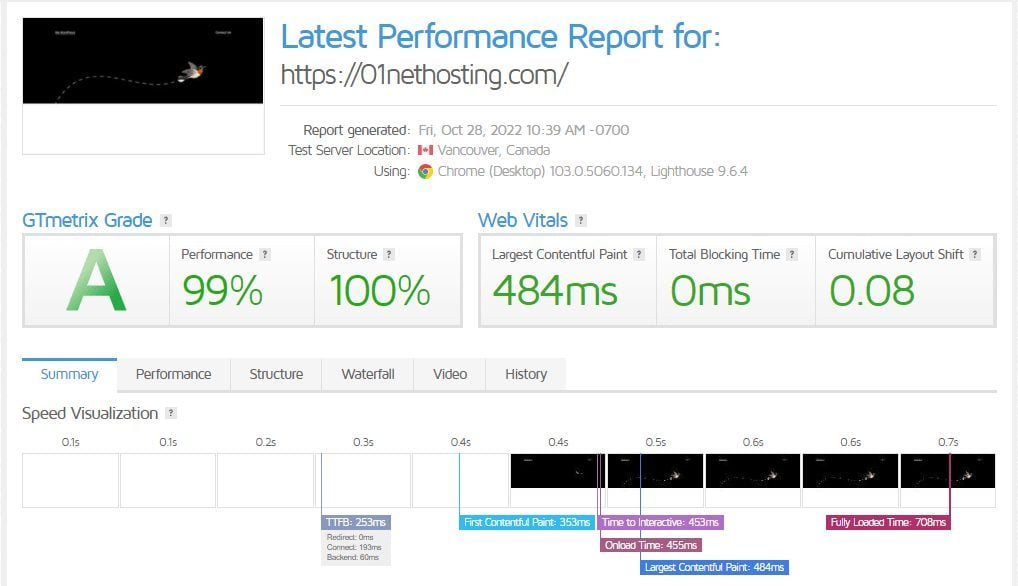
Now, here’s what WPX Hosting showcased in our GTmetrix tests:
- TTFB: 116 ms
- FCP: 233 ms
- LCP: 302 ms
- FLT: 329 ms
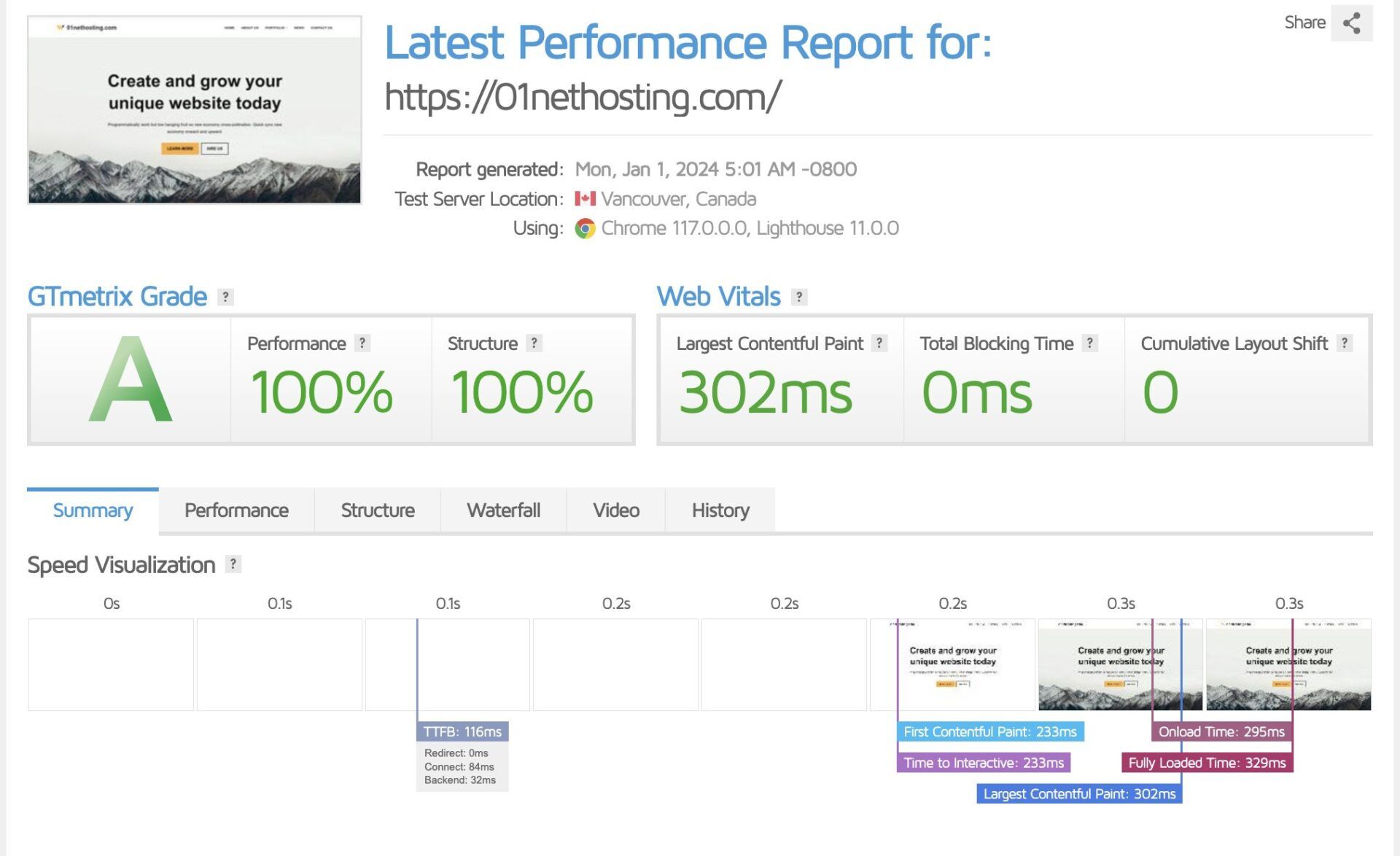
Ideal values for all of these metrics, according to GTmetrix, are:
- TTFB: under 800 ms
- FCP: under 1.8 s
- LCP: under 2.5 s
- FLT: under 3 s
You’ll agree that both are way under the “ideal” values. However, WPX Engine again shines, outperforming SiteGround by a considerable margin in 2025. It ultimately loads the page faster while also providing an exceptional server response (TTFB), securing the victory in this comparison.
🏆 Winner: WPX Hosting
Security: Which Web Host Is the Safer Option?
Both SiteGround and WPX Hosting are fully equipped. You’ll get no shortage of advanced security features that’ll keep your website clean as a teardrop. SiteGround offers quite a few extraordinary features, such as:
- Free SSL
- Malware protection
- Daily website backups
- DDoS protection
- Proactive website monitoring with a Web Application Firewall
- AI anti-bot system
WPX Hosting repeats SiteGround’s success, perhaps even surpassing it in some instances. It offers:
- Free SSL
- Hybrid DDoS protection
- Daily website backups
- Brute-force protection
- Daily malware scans
- Managed WAF
- WHOIS Privacy
They, to some extent, offer the same security features. However, WPX utilizes enterprise-level DDoS and brute-force protection. It also automatically enables WHOIS privacy if you purchase a domain through it. On the other hand, SiteGround’s AI anti-bot displays impressive performance.
It’s a self-learning security tool that adapts to new threats, discovers them with greater efficiency, and removes them before they can harm your website. On-demand and daily backups are standard in both, and we often consider them essential security features for preventing file loss.
As for their SSL, you’ll get Let’s Encrypt out of the box. The option to buy a premium SSL is available, but Let’s Encrypt will suffice, especially with its numerous robust security features. We should consider SiteGround’s budget-friendly WordPress hosting price this time, which still offers a range of security features.
WPX Hosting is maybe just a bit better—just a bit, at a considerably higher price. In practice, the difference isn’t felt, and both providers will do their magic equally well, with no holes for malware, snoopers, hackers, cybercriminals, or anything (or anyone) else that would compromise your website.
🟰 Winner: Tie
Customer Support
Onto the customer service comparison.
SiteGround and WPX offer a few problem-solving methods that include:
- 24/7 live chat support
- Ticketing support
- Knowledge Base
If you’re stuck in the mud, you can always get out before it swallows you. It’s easier to do so in WPX, as the provider responds slightly faster. SiteGround’s 24/7 live chat service is available when you’ve exhausted the knowledge base and can’t find what you’re looking for initially.
Then, you’ll be able to get in touch and explain the issue. This issue will sometimes be resolved on the spot or escalated to the ticketing system for further analysis should it prove to be more complex. The level of helpfulness never ceases to amaze us on both sides, despite SiteGround’s slight “inconvenience.”
Additionally, their knowledge bases are filled with various information on different hosting-related issues. Even if you’re too shy to chat, you’re likely to find a solution to the given problem and escape the turmoil. We can’t help but end the round with a tie as we slowly segue into the conclusion.
🟰 Winner: Tie
Our Conclusion: SiteGround Wins Against WPX
The initial SiteGround vs WPX comparisons were all about SiteGround holding the reins. As we progressed, we found that both web hosts are excellent for WordPress and offer some of the best speeds, features, customer support, and security. So, which one has ultimately won?
For us, that’s SiteGround.
We take nothing away from WPX Hosting, and we think it’s an even better option in some cases. Speed and performance are, in particular, a class above in WPX Hosting, with outstanding, enterprise-level security features worth a fortune. However, that worth in fortune is a big issue for WPX.
Having tested them thoroughly, we noticed that we were doing just fine, if not the same, with a few times cheaper SiteGround hosting. It’s funny how an affordable option can be just as good. If you have a lot of money to spend, then you won’t mind WPX being your preferred hosting provider in 2025.
If you have a less flexible budget, SiteGround remains a highly popular and impressive option for a lower price. The math shows that SiteGround took more rounds than WPX, making it a clear winner in today’s comparison.